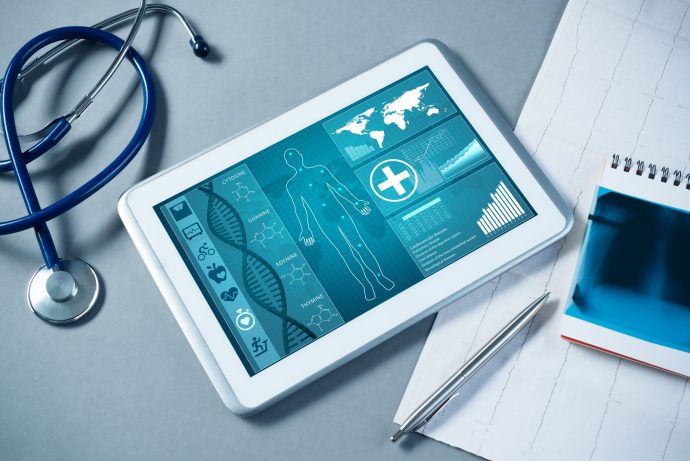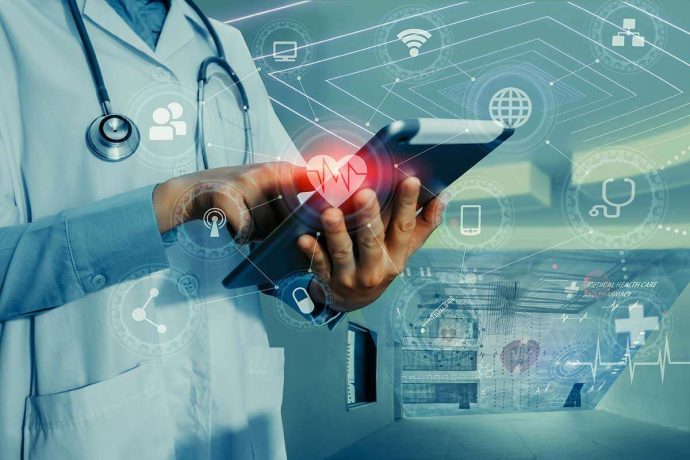Research and technology have long played a vital role in the health industry and will undoubtedly continue to do so in the future.
Academic research underpins how the healthcare system operates, while technology facilitates more efficient ways for the industry to function.
There have previously been multiple attempts to drive innovation in the health system in the United Kingdom and some solid structures are already in place.
These have been led by organisations such as UK Research and Innovation (UKRI), National Institute of Health Research (NIHR) and the Academic Health Science Networks (AHSNs).
The establishment of the Accelerated Access Collaborative (AAC), hosted by NHS England and NHS Improvement, was a major step forward in building partnerships to streamline health innovation across the NHS.

While plenty of good work has been done, many people still argue that the adoption of digital technologies in healthcare could be improved.
The barriers include technologies not working with current systems or a lack of skills in staff to integrate the tech effectively.
Building towards fully integrated digital service delivery and infrastructure presents challenges to creating a more coordinated health system.
Harnessing a workforce able to design systems and use the data in clinical settings is one of the key elements the sector must address moving forward.
With that in mind, we take a closer look at some of the ways research and technology is currently impacting the healthcare industry in the UK.
Online pharmaceutical products
Obtaining pharmaceutical products has never been easier, with the internet awash with reputable online pharmacies.
There was initially plenty of resistance within the healthcare to the concept of selling pharmaceuticals online, but attitudes have changed over time.
Effective monitoring and improved regulation have helped the online pharmaceuticals become big business in recent years.
There are several advantages to buying pharmaceuticals online including convenience, stock availability and cost.
Medical professionals have also benefited from using the internet to deliver improved levels of care to their patients.
Information can be sent directly to online or land-based pharmacies to ensure speedier dispensing of medically prescribed drugs.
Supplements

The supplements industry often gets a bad rap, particularly with regards to the veracity of the claims made by many of the companies operating in the sector.
However, as highlighted by the supplements experts at PreWorkout.org, advancements in research are helping to change the public perception of the supplements sector.
Used in conjunction with a healthy diet, there is now plenty of evidence that supplements can benefit your overall wellbeing.
They are also useful as a support tool for training, with athletes able to use pre-, intra- and post-workout supplements to boost performance and aid recovery.
Products containing creatine have repeatedly been proven to deliver significant fitness gains when the recommended dosage is consumed.
As the research continues to advance, the supplements industry will increasingly be viewed as an essential part of delivering positive health outcomes.
Communication & diagnosis
Technology has significantly improved communication in healthcare, allowing workers in the sector to interact with each other and patients more effectively.
Doctors can consult, diagnose, educate, advise and treat patients through telecommunication mediums such as instant messaging, video calls and smartphones.
Telehealth applications also allow for the integration of electronic health records to further improve healthcare communication and diagnosis.
Remote patient monitoring has become increasingly prevalent, with tech allowing for data to collected from the patient’s location and transmitted securely to a health professional.
Collaborative consultations can be facilitated, thus reducing the number of in-person appointments needed and delivering better outcomes for patients.
This serves to make the healthcare system more efficient and ensures that care is delivered to patients much earlier than has previously been the case.
Health apps
Health apps have become all the rage in recent years, helping health professionals deliver better quality treatment and patients increasingly engage in self-care.
Apps reduce the strain on the overstretched healthcare system by providing patients with the ability to evaluate their symptoms if they fall ill.
They are also an essential support tool in helping patients receive notifications about when to take medication, book medical appointments or renew prescriptions.
Medical professionals can use app reminders to regularly check up on their patients, keep up with the recovery status or follow up with patients with chronic conditions.
Health apps also crossover into the fitness sector, allowing people to monitor their progress in key areas if they undertake regular training.
They can be extremely useful in supporting mental health, providing people with the tools they need to overcome anxiety and depression.
Cloud-based storage

Unlike maintaining a server-based database, keeping patient information and digital records in the cloud is a cost-effective storage solution for the healthcare industry.
Cloud communications in the public sector could save massive amounts of money depending on the scale of internal operations and institution size.
One of the biggest advantages of using cloud-based storage is the in-built recovery and back-up features the technology possesses.
They provide an important layer of security in case of attempted data breaches or system failures, thus reducing investment in damage control.
Cloud-based storage systems also allow for individuals to have greater control over their own healthcare data and who can access it.
Many elements of healthcare are still not integrated, but cloud-based storage provides a platform for this to be achieved in the future.
The final word
Research and technology currently underpin the delivery of healthcare in the UK and will increasingly do so in the future.
While the UK remains some way off establishing a fully integrated digital system, it is unlikely to be too long before this is achieved.
Research will inform how this system works, while technology will provide healthcare organisations with the tools to successfully deliver on the recommendations.















